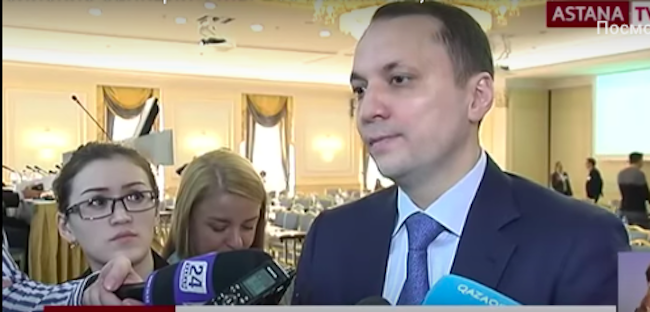The foreign investors who dare to pour their money into Kazakhstan have become used to the appetites of the local officials. All kinds of “feedbags” given for «разведение» проблемы have been the norm for a very long time. However, it is something of a novelty when the state agencies employ fraudulent schemes. As, for instance, the case of the Ministry for Investment and Development demonstrates.
On January 24, 2019, Prime Minister of Kazakhstan Bakytzhan Sagintayev signed Governmental Order #7 called “On the Draft of the Presidential Decree “On Some Steps for Increasing the Competitive Abilities of the National Economy”.
The document states that, “in order to increase the competitive abilities of the national economy and to stimulate investment activities in the Republic of Kazakhstan, the Government has appealed to President Nursultan Nazarbayev with the following requests.
- To create direct investment fund “The Kazakhstan Investment Development Fund” and a company for managing its assets with the state’s 100% participation in their authorized capital in accordance with the current law of the Astana International Financial Center.
- To identify attracting investments in the Kazakh economy as the main goal of the managing company’s activities.
- To allocate, in accordance with the current legislature, a specific-purpose transfer in the amount of 370000000000 (three hundred seventy bln) tenge from the National Fund of the Republic of Kazakhstan to the 2019 state budget for the purpose of creating the Fund.
Since, previously, Nursultan Nazarbayev had time and again criticized the Government and Prime Minister Bakytzhan Sagintayev personally for their desire to get their hands on the National Fund (with or without a cause) and eventually managed to significantly decrease the planned subsidizing of the state budget in 2019 – 2021, there is likelihood that the President will refuse.
But there is an even greater likelihood that he agrees: it is doubtful that the Prime Minister would take chance of voicing such request without first consulting those officials who, one way or another, are involved in dealing with such issues and routinely visa corresponding decrees. Moreover, they will try to convince Nazarbayev that these instruments for attracting investments are effective and have already been tested by other countries, and with positive results.
In our opinion, the effectiveness of such instruments is close to a zero, especially in Kazakhstan. And not only due to the objective reasons including the evident lack of competitive abilities of the non-resource sectors of the economy, the deficit of the high-quality labor force and the high logistics costs. A great many problems originate from the subjective certainty of the Kazakh state officials regardless of the rank in the effectiveness of an attractive “bait” that the foreign investor, in their opinion, is bound to take.
However, the quality investors both the local and the foreign ones consider not only a potential profitability of a given business but also the risks involved. Therefore, they are concerned not only about today, but about the past and the future.
In the future, they see the risks of the upcoming power transit in Kazakhstan in the course of which Nursultan Nazarbayev’s successor, after becoming the new head of the authoritarian political system and the super-presidential vertical, will inevitably recut the spheres and zones of influence of the elite clans in the economy simply for the purpose of holding on to the power. This will invariably affect the big and middle-size business, in other words, the investors who have dared to pour the money into the country.
As for the past, they see how difficult it is for investors to operate in the country where those are right who have more rights, where corruption in the state apparatus is the norm rather than an exception.
As a result, only those investors who are prepared to take extra risks arrive and remain in Kazakhstan. With that, all of them will have to fight not only the numerous difficulties but also the bureaucratic apparatus that consists of dozens of different structures and hundreds of officials a large part of whom is capable of interfering (harming, hindering, embezzling, blocking the way) rather than helping (aiding, easing, giving advice) simply due to the desire to “make money” personally, today, at this very moment and as much as one possibly can.
As an individual example, let us recall the employees of the former Ministry for Investment and Development that, on December 26, 2018, via the Presidential decree, was transformed into the Ministry of Industry and Infrastructural Development. Had they been suspected of corruption only, it would have been “normal” for Kazakhstan. But, based on the information provided by our insiders, here we are talking not so much about bribes per se as a clear-cut case of fraud with the participation of one of the agency’s top-officials, Vice-Minister Timur Toktabayev.
Judging by the documents we have at our disposal, the problem of the investor (or, rather, the victim of this story) has to do with MTS-Ertis LLP that, on October 15, 2014, signed a contract on carrying out the polymetallic ore explorations at the Vavilonkoye ore field (East-Kazakhstan region).
Metal Trade Company LLP that owned 90% of MTS-Ertis’ shares sold them twice – first, to the Dutch investor Babylon Holdings B.V. and then to SK Atrium LLP.
It appears that the Ministry’s employees, being aware of what was going on, were trying to conceal that fact from the investor probably hoping that the truth would never see the light of day. Moreover, they quietly gave SK Atrium the official rights for the object of mineral resource management even though they had the same application from Babylon Holdings B.V.
According to the insiders, the reasons for such behavior on the part of the Ministry’s employees lie in a demand for a bribe. Apparently, a Vice-Minister (the sources name Timur Toktabayev) demanded US$250 thousand from each contender and made a decision in favor of SK Atrium that agreed to satisfy the demand.

Another suggestion is that the reasons of this kind of behavior on the part of Zhenis Kasymbek’s deputy lie in his passions for gambling including paying visits to casinos abroad.
Currently, the first round of the scandal has begun: the official claims have been filed to the Kazakh law-enforcement agencies following the fact of fraud, the claims to the international arbitration court are being prepared, consultations and negotiations are underway. By the looks of it however, the scandal promises to be big; all the more so, since Timur Toktabayev enjoys the trust and protection of his boss Zhenis Kasymbek and a number of influential people from Nazarbayev’s closest circle. Apart from that, as a former NSC employee, Toktabayev has got connections in the law-enforcement system of the country.
Even though it is obvious that, against the backdrop of the cases of Moldovan investor Anatoli Stati and the others who have lost their money in Kazakhstan, the case at hand will not be too high-profile, it will undoubtedly intensify the concerns of those who are being invited to the country by Akorda and Nursultan Nazarbayev personally and with such persistence. Indeed, here we are already talking about not only the demands for bribes but the plain and simple possibility of being left high and dry.
* The nickname of Ostap Bender, the main character of Ilya Ilf and Evgeniy Petrov’s famous novels “The Twelve Chairs” and “The Little Golden Calf”. In the Russian-speaking cultures, the expression “the great combinator” has become a household name and is used to describe someone thought to be an ingenious con-artist and a wheeler-dealer.





